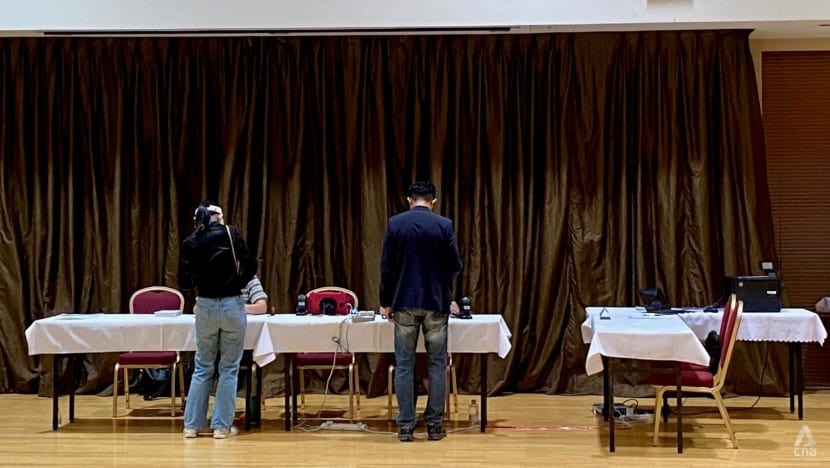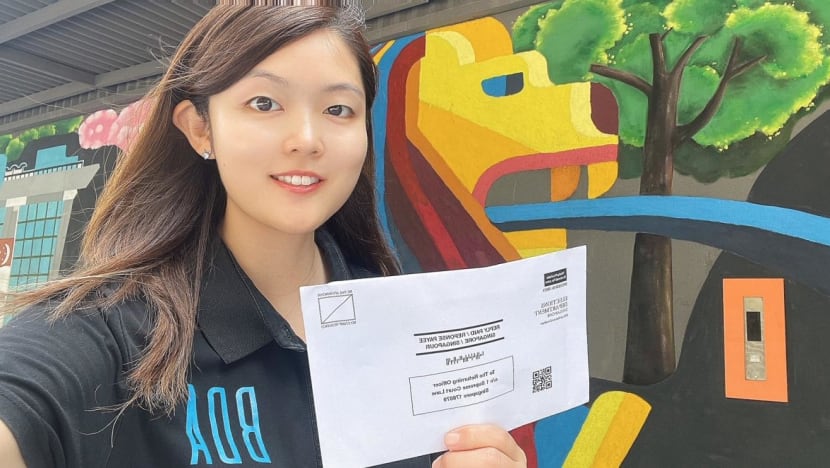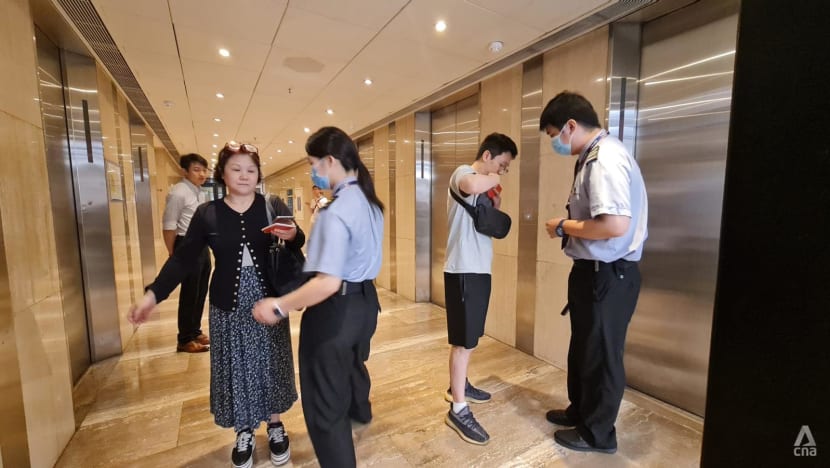
Singaporeans preparing to vote at the Singapore Embassy in Beijing on Friday, Sep 1. (Photo: Olivia Siong/CNA)
Some 6,649 Singaporeans who are living overseas registered to vote for the Presidential Election.

Singaporeans preparing to vote at the Singapore Embassy in Beijing on Friday, Sep 1. (Photo: Olivia Siong/CNA)
Singaporeans turned up at various overseas polling stations, in cities such as Beijing, Hong Kong, Tokyo and London, to cast their votes for Singapore’s ninth President on Friday (Sep 1).
Some 6,649 Singaporeans who are living overseas registered to vote for the Presidential Election.
Of these, 3,217 will be casting their ballots in person at one of 10 overseas polling stations. The overseas polling stations are in Beijing, Canberra, Dubai, Hong Kong, London, New York, San Francisco, Shanghai, Tokyo and Washington.
“I thought it's important for us to come in person to physically put a vote in,” said Mr Teo Swee Wei, who works in Tianjin.
“Of course, there are other ways of voting, but I personally prefer to do it in person.”
The remaining 3,432 registered overseas voters are casting their ballot by post.
This is the first time postal voting will be used in an election, which means people living in areas with no polling stations do not have to travel to their nearest voting hub.
The return envelope containing the marked postal ballot paper must be postmarked before Polling Day and reach the returning officer in Singapore by Sep 11 to be accepted for counting.
Ms Christie Lieu is among those who sent in her ballot by post.

The 33-year-old has been living in China’s Yangjiang, a prefecture-level city of 2.6 million people, for about a year. There is no polling station where she is based, and the nearest one is three hours away in Hong Kong.
“(Postal voting) saves time and I don't have to take leave,” she said.
However, Ms Lieu, who had planned to send out her ballot early, still faced numerous obstacles, including having to go on a 21km drive downtown to send the overseas mail.
Even at the post office, the staff were not familiar with handling the return envelope, she said. In the end, she had to fork out 16 yuan (S$2.20) for registered mail to get her ballot sent back.
Yet, Ms Lieu said she is “more than happy to pay, because I wanted the vote to be counted for sure”.
“I thought the whole process could be better because – I'm not sure about other countries – but probably in China, language is also a barrier,” she added.
Some other voters in China also told CNA of similar experiences of being asked to pay a postage fee, while others said they simply dropped their vote in the mailbox.
The postal voting option comes after Parliament passed laws earlier in March to improve voting accessibility for Singaporeans abroad.
Before this change, overseas voters had to physically travel to polling stations in their specified locations. This made it difficult for some Singaporeans to vote, especially during the 2020 General Election due to COVID-19 curbs.
Even as many welcomed the added option and convenience of a postal ballot, a few raised concerns over whether their vote would reach Singapore by the stipulated deadline.
In response to CNA’s queries, the Elections Department (ELD) said those who downloaded their ballots would be considered as having tried to vote. Their names will not be removed from the registers of electors even if their ballot is not received.
Those whose ballots have been received will be informed via email after the counting of overseas votes is complete.

About 1,600 – or a quarter – of the registered overseas voters live in mainland China, Hong Kong and Taiwan. Some had missed out on voting at the General Election in 2020 due to COVID-19 travel restrictions.
For some who chose to vote in person, however, their plans were swept aside by weather conditions.
Among them is Singaporean Jason Lim, who lives in Guangzhou and had taken a day off work, intending to go to nearby Hong Kong to cast his vote.
However, the high-speed rail train that he booked to Hong Kong was cancelled as Super Typhoon Saola hurled towards China’s south.
“I was so disappointed and I was thinking, is there any other way? I even thought of flying back to Singapore to vote,” said the 45-year-old, adding he wished he had opted for the postal ballot.
“Because of the typhoon, even planes are most likely unable to fly on Friday. So my plans were disrupted. I wasn't able to vote.”
Still, some in Hong Kong braved the bad weather to vote for the next Singapore president.
One voter said: “I don't live near the MTR station, so I had to walk because the buses are all not running.”
The Singapore Consulate-General in Hong Kong announced on Friday morning that voting would proceed in the city, even though the third highest typhoon warning was issued in the early hours.
In view of the warning signal, registered voters who decide not to cast their ballot for safety reasons can reach out to the ELD to restore their names to the Register of Electors.
In Tokyo, Singaporeans had to brave a different kind of weather condition to vote.
The Japanese capital is experiencing a heatwave, hitting close to 35 degrees Celsius. It is the hottest summer ever for the city since temperatures were recorded from 1898.

However, married couple Desmond Teo and Angie Chan were so determined to vote that they decided to work in a cafe near the Singapore Embassy, so they could quickly cast their ballots.
This is their second time voting in Tokyo.
“We understand the importance of electing our president,” said Mr Teo. “This is us doing our part for our country even though we are away from Singapore.”
To accommodate electorates considering the heatwave risk, embassy staff had to make various preparations.
“The polling station is located within the embassy which is air-conditioned. There’s a lot of shade in our vicinity,” said Mr Isaac Lee, First Secretary (Political) at the Singapore Embassy in Tokyo.
“We also standby bottles of water for the members of the public who may need it. Our embassy staff is on hand to assist any voters who may feel discomfort especially due to the heat.”
Meanwhile, at the Singapore embassy in Beijing, Singaporeans trickled in throughout the day to vote without much hassle.
A small line of around 10 had formed outside even before the polling station opened to voters. Some were hoping to get their vote in early before heading off to work.
Beijing is one of two polling stations in mainland China. The other is in Shanghai.
Voters told CNA that the process was quick and smooth.
“This is my second time voting (overseas) and I think it's important because we have a voice even though we're not in Singapore,” said Mr Raymond Choo, who lives in Beijing.
“It may be small but it’s still a voice to be heard.”
Overseas voters will account for about 0.25 per cent of voters registered for this election.
In London, some Singaporean voters said casting a physical ballot makes them feel as though they are part of the process.
“I think it’s important to vote in person because there could be technical issues that Singaporeans are not familiar with,” said one voter.
“There could be issues with postmarks, with whether your vote arrives to the returning officer in time. These are not tested yet and I decided to play it safe so that’s why I decided to show up in person to cast my vote.”
Voters interviewed said if the election is close, overseas voters could make all the difference.
“It’s important to be politically engaged, especially as someone living abroad," said one Singaporean. "I think it helps me stay connected to Singapore.”
Everything you need to know about the Singapore Presidential Election: cna.asia/pe2023